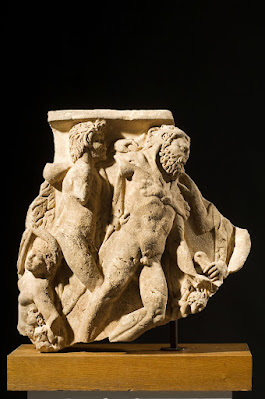 |
| Giacomo Cassetti Personification of Europe before 1757 limestone National Trust, Waddesdon Manor, Buckinghamshire |
 |
| Giacomo Cassetti Personification of America before 1757 limestone National Trust, Waddesdon Manor, Buckinghamshire |
 |
| Leonhard Kern Abundance ca. 1630 ivory Victoria & Albert Museum, London |
 |
| Leonhard Kern Charity ca. 1630 ivory Victoria & Albert Museum, London |
 |
| Leonhard Kern Cain and Abel ca. 1640 ivory Victoria & Albert Museum, London |
 |
| Roman Empire Apollo 1st century AD marble statue (heavily restored) Chrysler Museum of Art, Norfolk, Virginia |
 |
| Jean-Baptiste Carpeaux Eve banished from Paradise 1874 terracotta statuette Minneapolis Institute of Art |
 |
| Roman Empire Artemis (torso) joined to Athena (head) 1st century AD marble Walters Art Museum, Baltimore |
 |
| Anonymous French Artist Hercules and the Nemean Lion ca. 1600-1625 bronze statuette Metropolitan Museum of Art, New York |
 |
| Roman Empire Hercules and Bacchic Figures AD 193-217 marble relief (sarcophagus fragment) National Gallery of Norway, Oslo |
 |
| Anonymous Flemish Artist Descent from the Cross ca. 1540 carved and painted oak relief (altarpiece fragment) Victoria & Albert Museum, London |
 |
| Anonymous Neapolitan Artist Sepulchral Effigy of a Lady ca. 1500-1530 marble relief Victoria & Albert Museum, London |
 |
| Anonymous Neapolitan Artist St Sebastian and Prophet ca. 1475-1500 marble relief Victoria & Albert Museum, London |
 |
| Anonymous British Artist Backgammon Piece with Samson and Delilah ca. 1130-40 walrus ivory Victoria & Albert Museum, London |
 |
| Anonymous Styrian Artist Virgin and Child with Angels ca. 1500-1520 carved and painted limewood (altarpiece fragment) Victoria & Albert Museum, London |
 |
| John Bacon the Elder Bust of Queen Elizabeth I ca. 1780 Coade stone Metropolitan Museum of Art, New York |
 |
| Andrea della Robbia Lamentation Group ca. 1510-15 enameled and painted terracotta Victoria & Albert Museum, London |
from Songs My Mother Taught Me
Dvorak's "Songs My Mother Taught Me,"
From the cycle Gypsy Melodies, anticipates
The sonorous emotions of the Trio in F Minor,
Though without the latter's complications.
The melody is simple, while the piece's
Mood looks backwards, carried by the sweet,
Sustaining rhythms of the mother's voice
Embodied in the figure of the violin, until,
Upon the second repetition of the theme
And on a high, protracted note, it suddenly
Evaporates, while the piano lingers underneath.
The world remains indifferent to our needs,
Unchanged by what the mind, in its attempt to
Render it in terms that it can recognize,
Imagines it to be.
Imagines it to be.
* * *
In a few days
Everything had altered, and yet nothing changed –
That was the anomalous event that happened
In the ordinary course of things, from which the
Rest of us were simply absent, or preoccupied,
Or busy with arrangement for the flowers,
The music, the reception at the house for various
Cousins, aunts, and uncles and, from next door,
Mr. Palistini with his tooth of gold. At
Length the house was empty, and I went outside.
It struck me that this place, which overnight
had almost come to seem a part of me, was actually
had almost come to seem a part of me, was actually
The same one I had longed for years to leave.
There were differences of course – another
House or two, and different cars – and yet what
Startled me was how familiar it all seemed –
The numbers stencilled on the curb, the soap-dish
In the bathroom, the boxes still in the garage –
As though the intricate evasions of the years
Had left their underlying forms unchanged.
And this is not to say those fables were untrue,
But merely that their spells were incomplete –
Incomplete and passing. For although we can't
Exist without our fantasies, at times they
Start to come apart like clouds, to leave us
Momentarily alone, within an ordinary setting –
Disenchanted and alone, but also strangely free,
And suddenly relieved to find a vast, inhuman
World, completely independent of our lives
And yet behind them all, still there.
And yet behind them all, still there.
– John Koethe (1997)